Case Study: Ethical Dilemma Faced by Executive Manager
VerifiedAdded on 2022/08/25
|7
|1510
|32
Case Study
AI Summary
This case study presents an ethical dilemma faced by an executive manager who witnesses a peer stealing confidential information. The manager is torn between reporting the unethical act, which could harm his friend and the friend's family, and concealing the act, which could negatively impact the company and the employee whose information was stolen. The assignment explores the dilemma through the lens of deontological and utilitarian ethics, analyzing the implications of each decision. The deontological perspective emphasizes adherence to rules and duties, while the utilitarian approach focuses on maximizing overall good. The manager ultimately decides to report the action, upholding his duties and responsibilities to ensure fair treatment and a healthy work environment, despite the potential consequences for his friend. The paper concludes with a discussion of the complexities of ethical decision-making in business and the importance of considering multiple ethical frameworks.
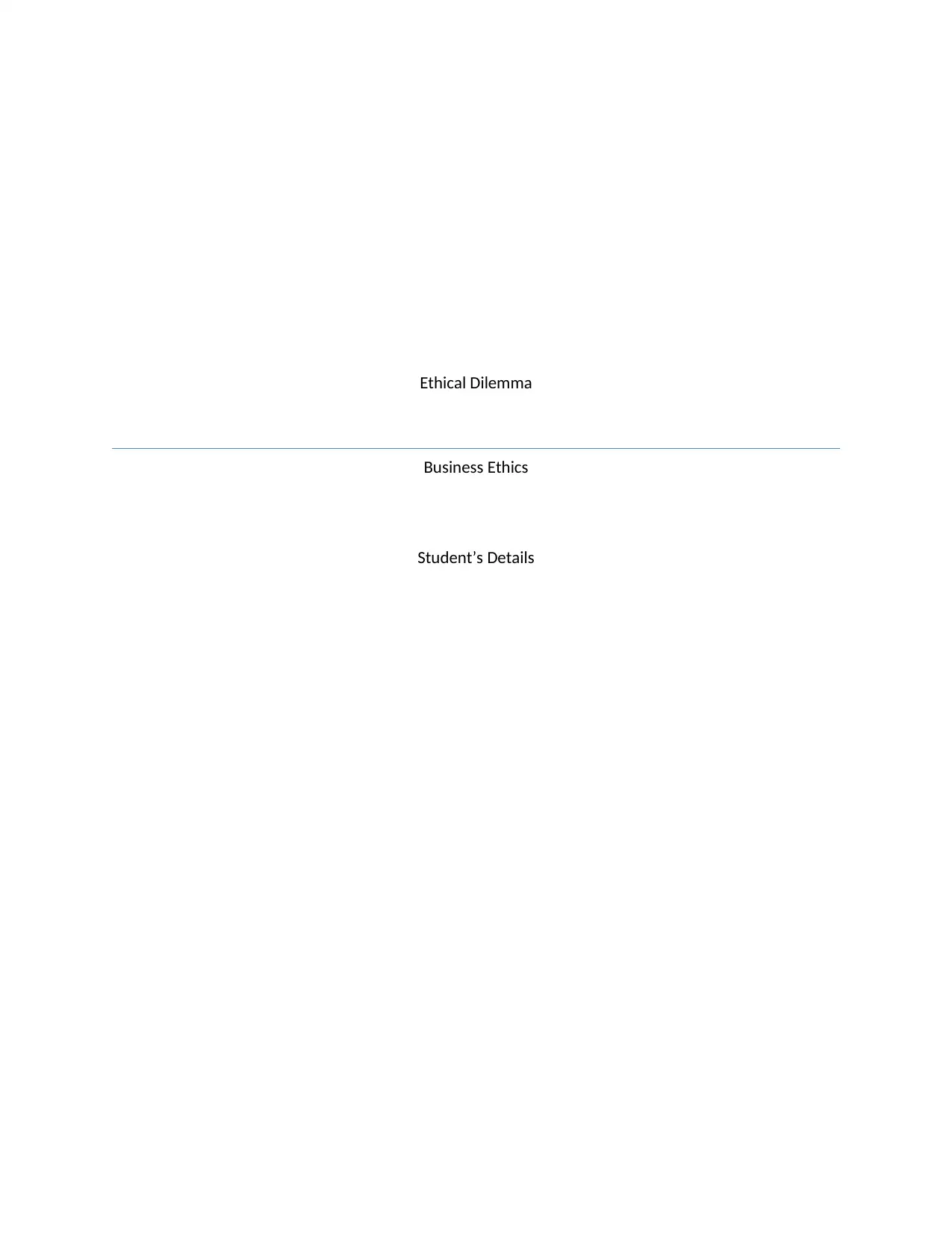
Ethical Dilemma
Business Ethics
Student’s Details
Business Ethics
Student’s Details
Paraphrase This Document
Need a fresh take? Get an instant paraphrase of this document with our AI Paraphraser
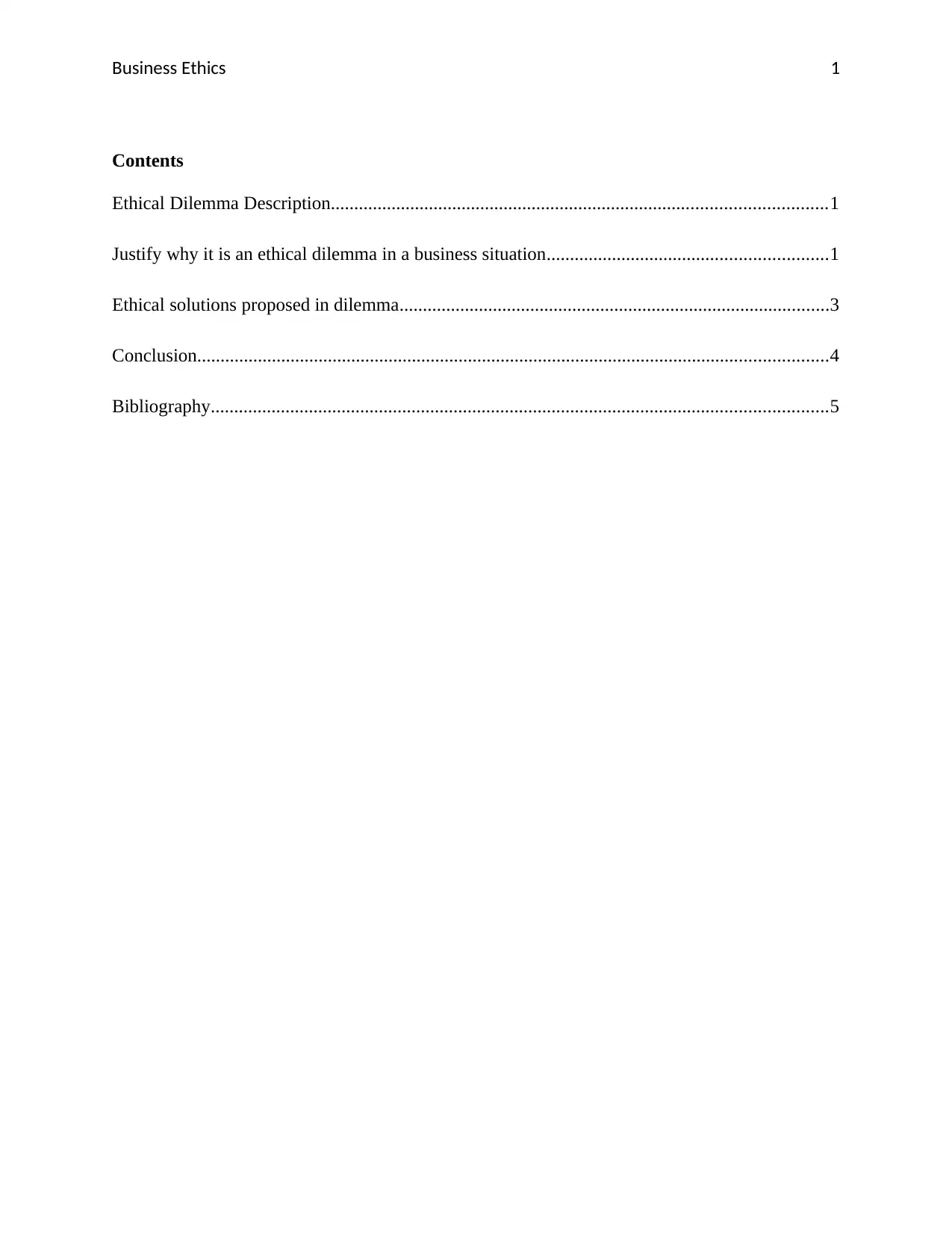
Business Ethics 1
Contents
Ethical Dilemma Description..........................................................................................................1
Justify why it is an ethical dilemma in a business situation............................................................1
Ethical solutions proposed in dilemma............................................................................................3
Conclusion.......................................................................................................................................4
Bibliography....................................................................................................................................5
Contents
Ethical Dilemma Description..........................................................................................................1
Justify why it is an ethical dilemma in a business situation............................................................1
Ethical solutions proposed in dilemma............................................................................................3
Conclusion.......................................................................................................................................4
Bibliography....................................................................................................................................5
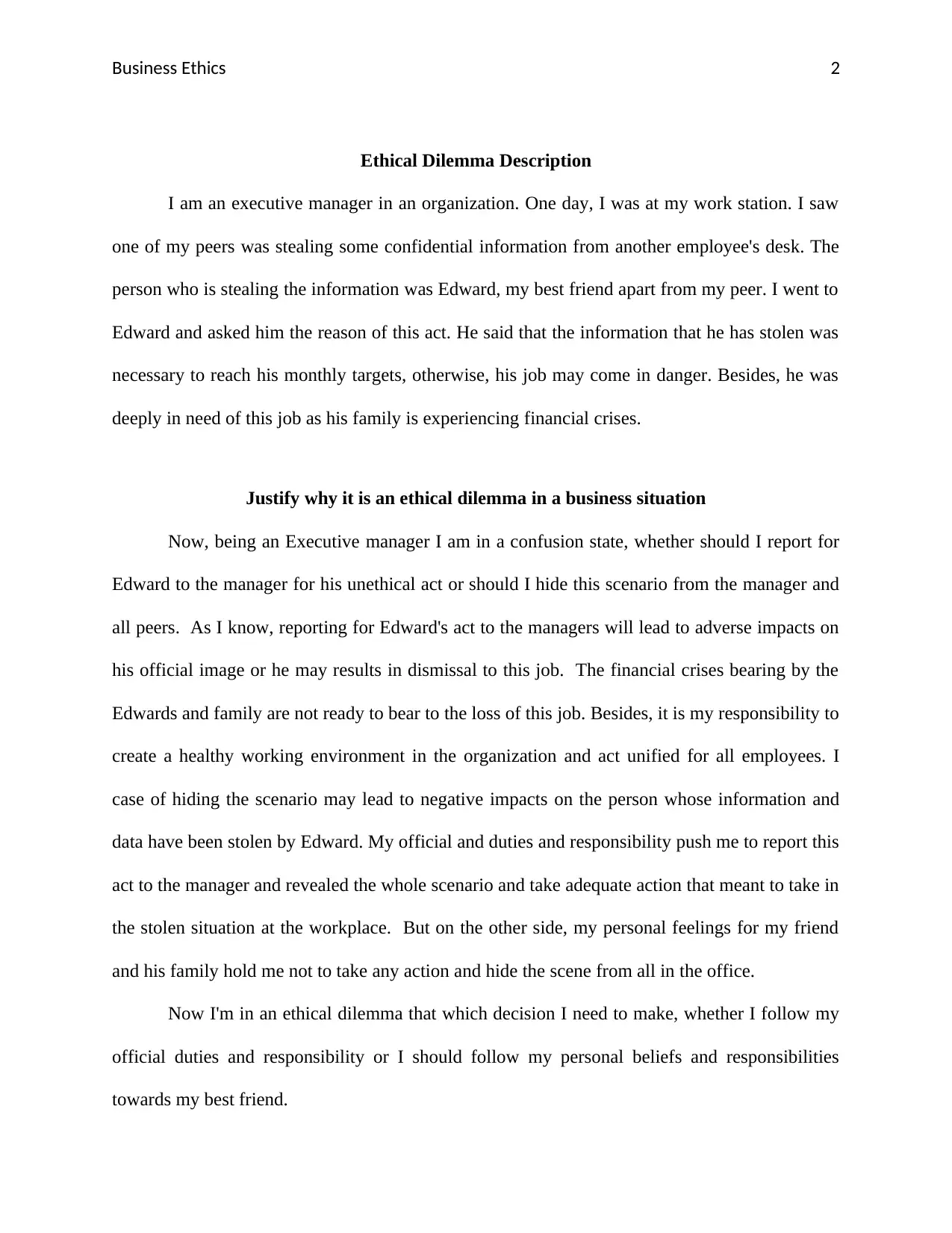
Business Ethics 2
Ethical Dilemma Description
I am an executive manager in an organization. One day, I was at my work station. I saw
one of my peers was stealing some confidential information from another employee's desk. The
person who is stealing the information was Edward, my best friend apart from my peer. I went to
Edward and asked him the reason of this act. He said that the information that he has stolen was
necessary to reach his monthly targets, otherwise, his job may come in danger. Besides, he was
deeply in need of this job as his family is experiencing financial crises.
Justify why it is an ethical dilemma in a business situation
Now, being an Executive manager I am in a confusion state, whether should I report for
Edward to the manager for his unethical act or should I hide this scenario from the manager and
all peers. As I know, reporting for Edward's act to the managers will lead to adverse impacts on
his official image or he may results in dismissal to this job. The financial crises bearing by the
Edwards and family are not ready to bear to the loss of this job. Besides, it is my responsibility to
create a healthy working environment in the organization and act unified for all employees. I
case of hiding the scenario may lead to negative impacts on the person whose information and
data have been stolen by Edward. My official and duties and responsibility push me to report this
act to the manager and revealed the whole scenario and take adequate action that meant to take in
the stolen situation at the workplace. But on the other side, my personal feelings for my friend
and his family hold me not to take any action and hide the scene from all in the office.
Now I'm in an ethical dilemma that which decision I need to make, whether I follow my
official duties and responsibility or I should follow my personal beliefs and responsibilities
towards my best friend.
Ethical Dilemma Description
I am an executive manager in an organization. One day, I was at my work station. I saw
one of my peers was stealing some confidential information from another employee's desk. The
person who is stealing the information was Edward, my best friend apart from my peer. I went to
Edward and asked him the reason of this act. He said that the information that he has stolen was
necessary to reach his monthly targets, otherwise, his job may come in danger. Besides, he was
deeply in need of this job as his family is experiencing financial crises.
Justify why it is an ethical dilemma in a business situation
Now, being an Executive manager I am in a confusion state, whether should I report for
Edward to the manager for his unethical act or should I hide this scenario from the manager and
all peers. As I know, reporting for Edward's act to the managers will lead to adverse impacts on
his official image or he may results in dismissal to this job. The financial crises bearing by the
Edwards and family are not ready to bear to the loss of this job. Besides, it is my responsibility to
create a healthy working environment in the organization and act unified for all employees. I
case of hiding the scenario may lead to negative impacts on the person whose information and
data have been stolen by Edward. My official and duties and responsibility push me to report this
act to the manager and revealed the whole scenario and take adequate action that meant to take in
the stolen situation at the workplace. But on the other side, my personal feelings for my friend
and his family hold me not to take any action and hide the scene from all in the office.
Now I'm in an ethical dilemma that which decision I need to make, whether I follow my
official duties and responsibility or I should follow my personal beliefs and responsibilities
towards my best friend.
⊘ This is a preview!⊘
Do you want full access?
Subscribe today to unlock all pages.

Trusted by 1+ million students worldwide
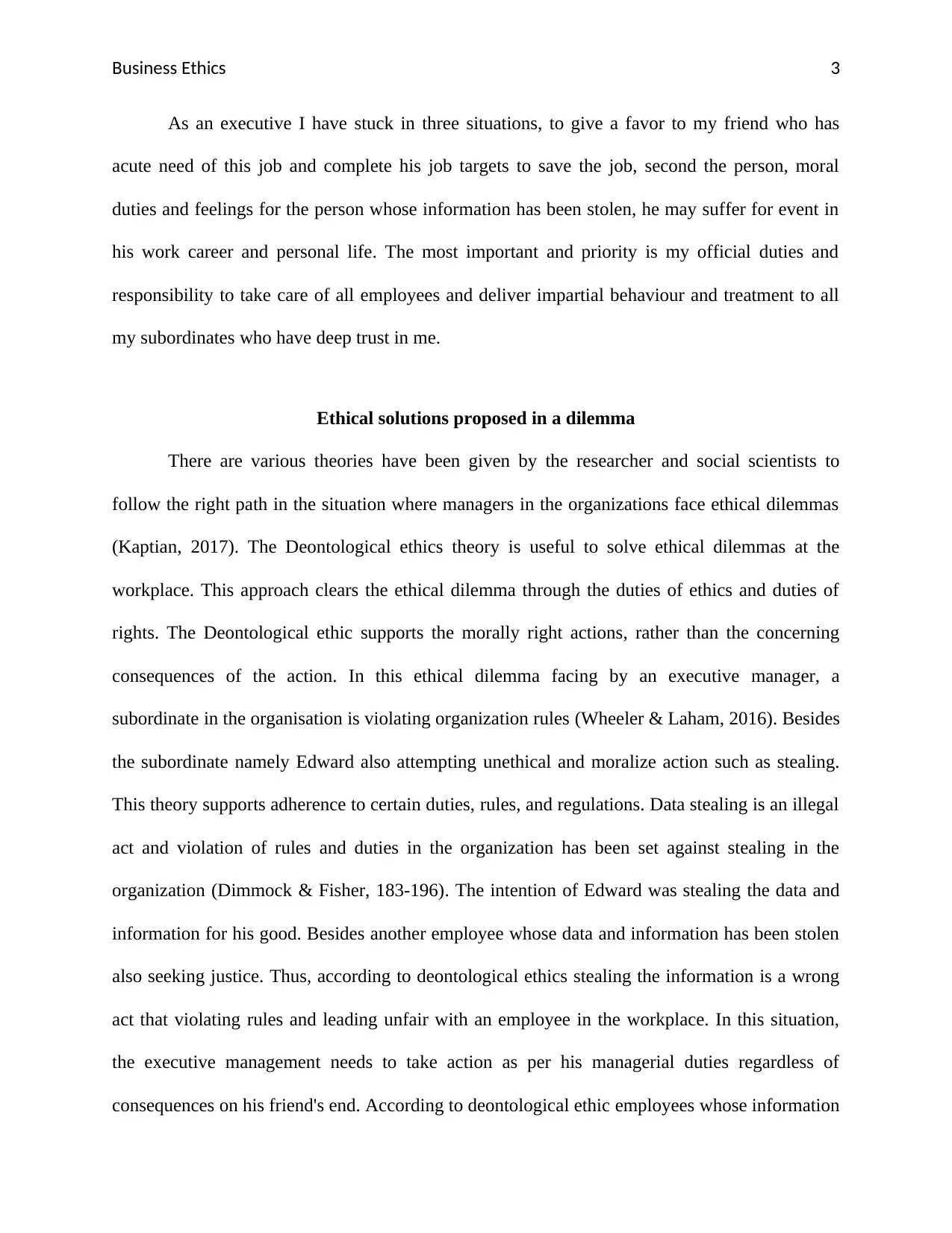
Business Ethics 3
As an executive I have stuck in three situations, to give a favor to my friend who has
acute need of this job and complete his job targets to save the job, second the person, moral
duties and feelings for the person whose information has been stolen, he may suffer for event in
his work career and personal life. The most important and priority is my official duties and
responsibility to take care of all employees and deliver impartial behaviour and treatment to all
my subordinates who have deep trust in me.
Ethical solutions proposed in a dilemma
There are various theories have been given by the researcher and social scientists to
follow the right path in the situation where managers in the organizations face ethical dilemmas
(Kaptian, 2017). The Deontological ethics theory is useful to solve ethical dilemmas at the
workplace. This approach clears the ethical dilemma through the duties of ethics and duties of
rights. The Deontological ethic supports the morally right actions, rather than the concerning
consequences of the action. In this ethical dilemma facing by an executive manager, a
subordinate in the organisation is violating organization rules (Wheeler & Laham, 2016). Besides
the subordinate namely Edward also attempting unethical and moralize action such as stealing.
This theory supports adherence to certain duties, rules, and regulations. Data stealing is an illegal
act and violation of rules and duties in the organization has been set against stealing in the
organization (Dimmock & Fisher, 183-196). The intention of Edward was stealing the data and
information for his good. Besides another employee whose data and information has been stolen
also seeking justice. Thus, according to deontological ethics stealing the information is a wrong
act that violating rules and leading unfair with an employee in the workplace. In this situation,
the executive management needs to take action as per his managerial duties regardless of
consequences on his friend's end. According to deontological ethic employees whose information
As an executive I have stuck in three situations, to give a favor to my friend who has
acute need of this job and complete his job targets to save the job, second the person, moral
duties and feelings for the person whose information has been stolen, he may suffer for event in
his work career and personal life. The most important and priority is my official duties and
responsibility to take care of all employees and deliver impartial behaviour and treatment to all
my subordinates who have deep trust in me.
Ethical solutions proposed in a dilemma
There are various theories have been given by the researcher and social scientists to
follow the right path in the situation where managers in the organizations face ethical dilemmas
(Kaptian, 2017). The Deontological ethics theory is useful to solve ethical dilemmas at the
workplace. This approach clears the ethical dilemma through the duties of ethics and duties of
rights. The Deontological ethic supports the morally right actions, rather than the concerning
consequences of the action. In this ethical dilemma facing by an executive manager, a
subordinate in the organisation is violating organization rules (Wheeler & Laham, 2016). Besides
the subordinate namely Edward also attempting unethical and moralize action such as stealing.
This theory supports adherence to certain duties, rules, and regulations. Data stealing is an illegal
act and violation of rules and duties in the organization has been set against stealing in the
organization (Dimmock & Fisher, 183-196). The intention of Edward was stealing the data and
information for his good. Besides another employee whose data and information has been stolen
also seeking justice. Thus, according to deontological ethics stealing the information is a wrong
act that violating rules and leading unfair with an employee in the workplace. In this situation,
the executive management needs to take action as per his managerial duties regardless of
consequences on his friend's end. According to deontological ethic employees whose information
Paraphrase This Document
Need a fresh take? Get an instant paraphrase of this document with our AI Paraphraser
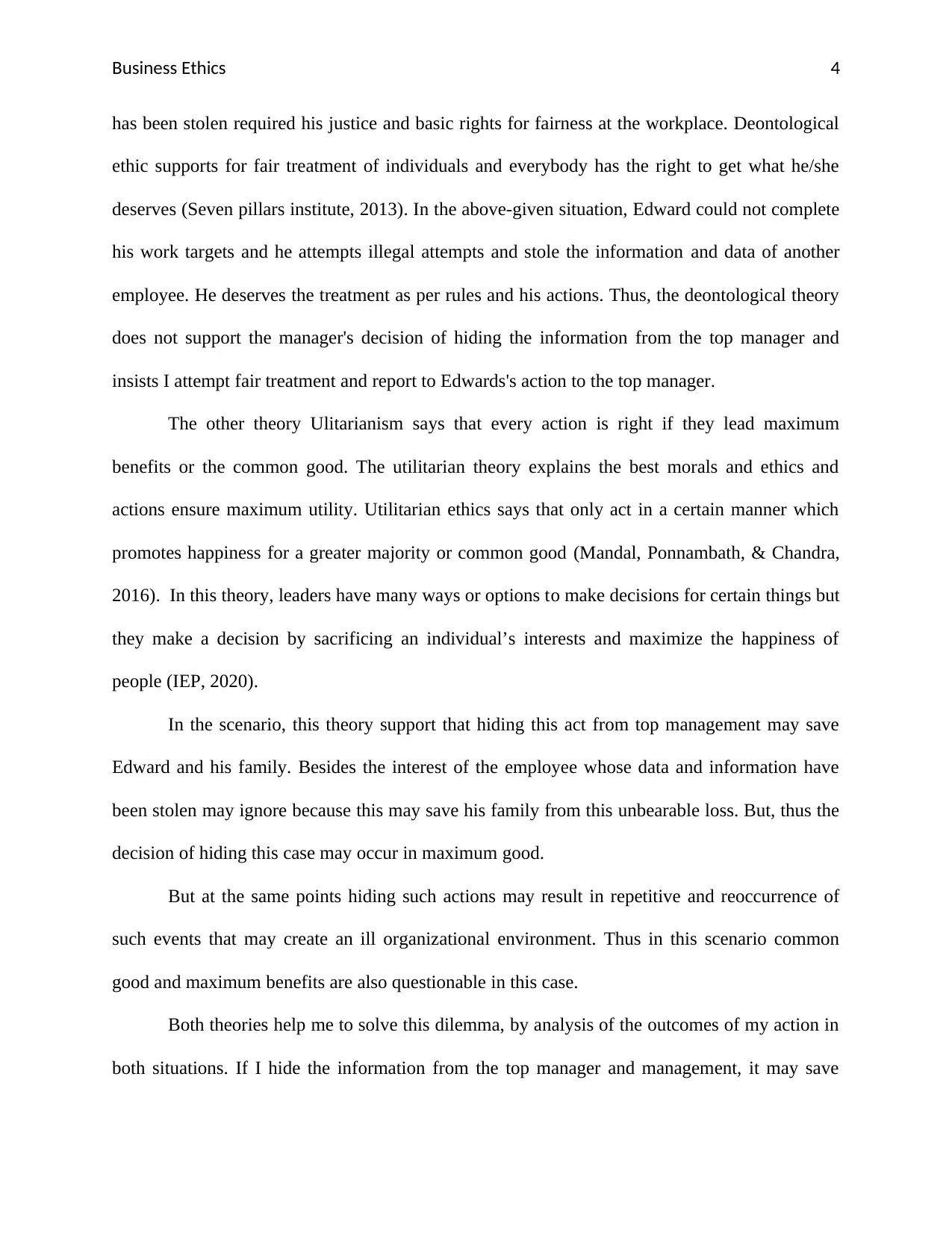
Business Ethics 4
has been stolen required his justice and basic rights for fairness at the workplace. Deontological
ethic supports for fair treatment of individuals and everybody has the right to get what he/she
deserves (Seven pillars institute, 2013). In the above-given situation, Edward could not complete
his work targets and he attempts illegal attempts and stole the information and data of another
employee. He deserves the treatment as per rules and his actions. Thus, the deontological theory
does not support the manager's decision of hiding the information from the top manager and
insists I attempt fair treatment and report to Edwards's action to the top manager.
The other theory Ulitarianism says that every action is right if they lead maximum
benefits or the common good. The utilitarian theory explains the best morals and ethics and
actions ensure maximum utility. Utilitarian ethics says that only act in a certain manner which
promotes happiness for a greater majority or common good (Mandal, Ponnambath, & Chandra,
2016). In this theory, leaders have many ways or options to make decisions for certain things but
they make a decision by sacrificing an individual’s interests and maximize the happiness of
people (IEP, 2020).
In the scenario, this theory support that hiding this act from top management may save
Edward and his family. Besides the interest of the employee whose data and information have
been stolen may ignore because this may save his family from this unbearable loss. But, thus the
decision of hiding this case may occur in maximum good.
But at the same points hiding such actions may result in repetitive and reoccurrence of
such events that may create an ill organizational environment. Thus in this scenario common
good and maximum benefits are also questionable in this case.
Both theories help me to solve this dilemma, by analysis of the outcomes of my action in
both situations. If I hide the information from the top manager and management, it may save
has been stolen required his justice and basic rights for fairness at the workplace. Deontological
ethic supports for fair treatment of individuals and everybody has the right to get what he/she
deserves (Seven pillars institute, 2013). In the above-given situation, Edward could not complete
his work targets and he attempts illegal attempts and stole the information and data of another
employee. He deserves the treatment as per rules and his actions. Thus, the deontological theory
does not support the manager's decision of hiding the information from the top manager and
insists I attempt fair treatment and report to Edwards's action to the top manager.
The other theory Ulitarianism says that every action is right if they lead maximum
benefits or the common good. The utilitarian theory explains the best morals and ethics and
actions ensure maximum utility. Utilitarian ethics says that only act in a certain manner which
promotes happiness for a greater majority or common good (Mandal, Ponnambath, & Chandra,
2016). In this theory, leaders have many ways or options to make decisions for certain things but
they make a decision by sacrificing an individual’s interests and maximize the happiness of
people (IEP, 2020).
In the scenario, this theory support that hiding this act from top management may save
Edward and his family. Besides the interest of the employee whose data and information have
been stolen may ignore because this may save his family from this unbearable loss. But, thus the
decision of hiding this case may occur in maximum good.
But at the same points hiding such actions may result in repetitive and reoccurrence of
such events that may create an ill organizational environment. Thus in this scenario common
good and maximum benefits are also questionable in this case.
Both theories help me to solve this dilemma, by analysis of the outcomes of my action in
both situations. If I hide the information from the top manager and management, it may save
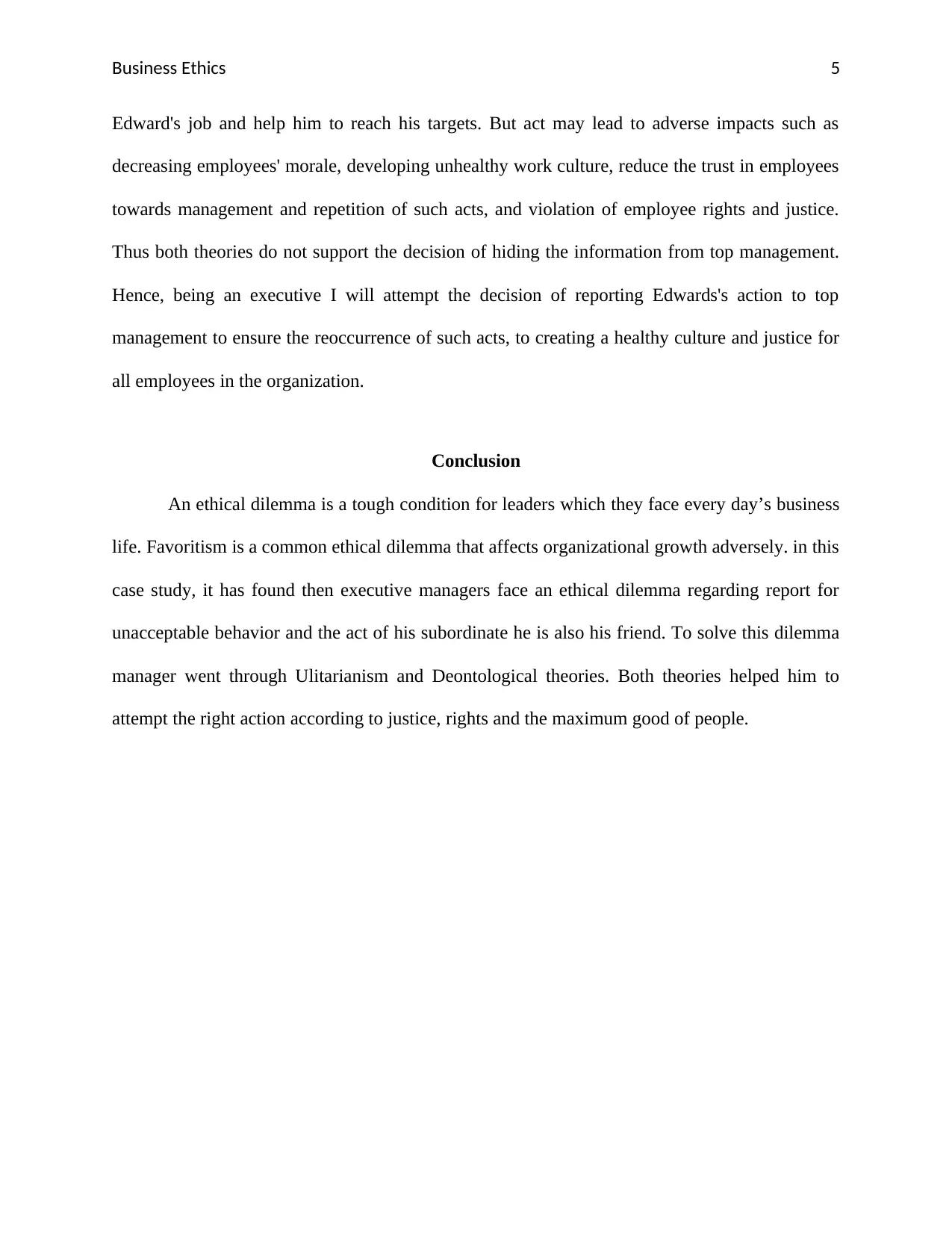
Business Ethics 5
Edward's job and help him to reach his targets. But act may lead to adverse impacts such as
decreasing employees' morale, developing unhealthy work culture, reduce the trust in employees
towards management and repetition of such acts, and violation of employee rights and justice.
Thus both theories do not support the decision of hiding the information from top management.
Hence, being an executive I will attempt the decision of reporting Edwards's action to top
management to ensure the reoccurrence of such acts, to creating a healthy culture and justice for
all employees in the organization.
Conclusion
An ethical dilemma is a tough condition for leaders which they face every day’s business
life. Favoritism is a common ethical dilemma that affects organizational growth adversely. in this
case study, it has found then executive managers face an ethical dilemma regarding report for
unacceptable behavior and the act of his subordinate he is also his friend. To solve this dilemma
manager went through Ulitarianism and Deontological theories. Both theories helped him to
attempt the right action according to justice, rights and the maximum good of people.
Edward's job and help him to reach his targets. But act may lead to adverse impacts such as
decreasing employees' morale, developing unhealthy work culture, reduce the trust in employees
towards management and repetition of such acts, and violation of employee rights and justice.
Thus both theories do not support the decision of hiding the information from top management.
Hence, being an executive I will attempt the decision of reporting Edwards's action to top
management to ensure the reoccurrence of such acts, to creating a healthy culture and justice for
all employees in the organization.
Conclusion
An ethical dilemma is a tough condition for leaders which they face every day’s business
life. Favoritism is a common ethical dilemma that affects organizational growth adversely. in this
case study, it has found then executive managers face an ethical dilemma regarding report for
unacceptable behavior and the act of his subordinate he is also his friend. To solve this dilemma
manager went through Ulitarianism and Deontological theories. Both theories helped him to
attempt the right action according to justice, rights and the maximum good of people.
⊘ This is a preview!⊘
Do you want full access?
Subscribe today to unlock all pages.

Trusted by 1+ million students worldwide
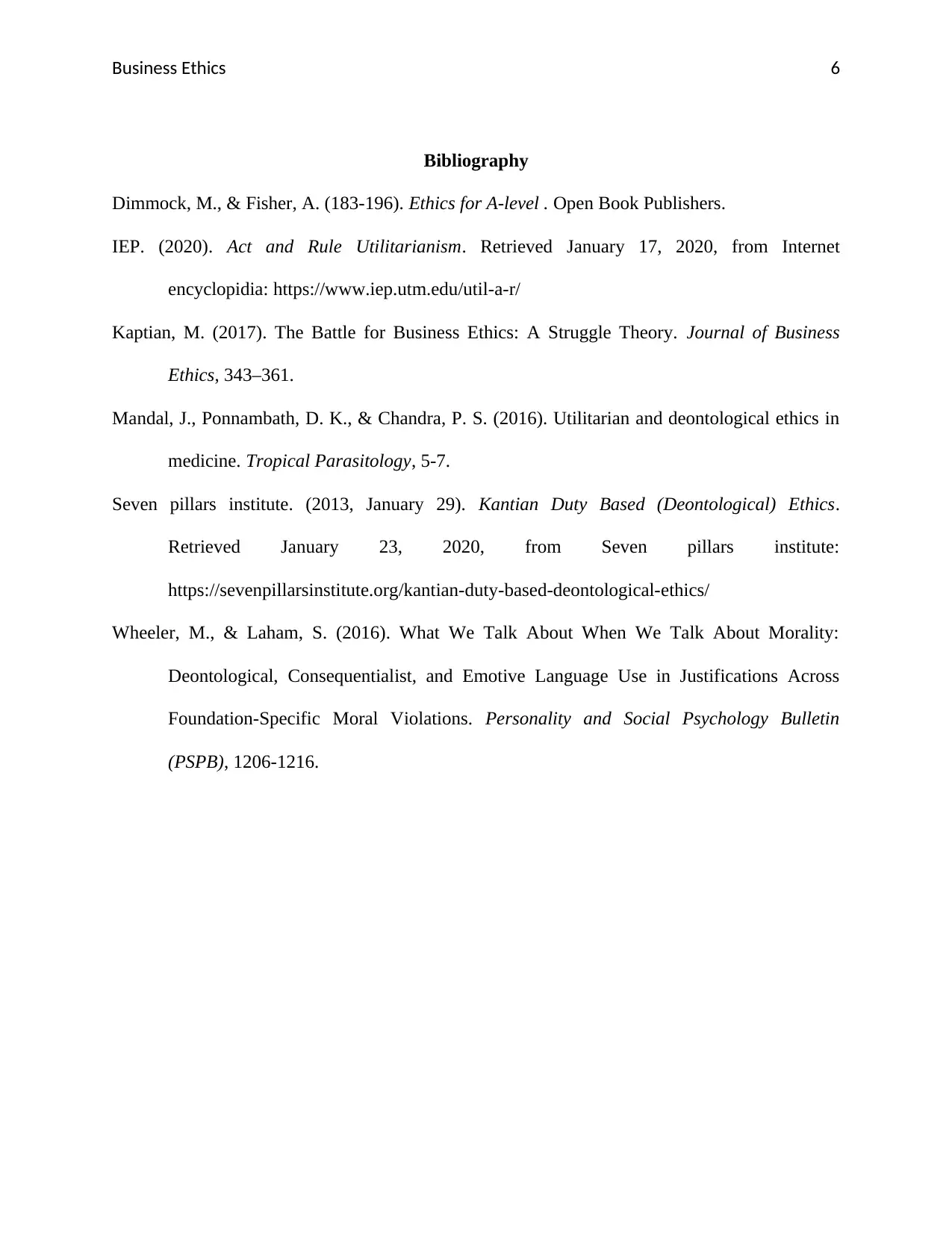
Business Ethics 6
Bibliography
Dimmock, M., & Fisher, A. (183-196). Ethics for A-level . Open Book Publishers.
IEP. (2020). Act and Rule Utilitarianism. Retrieved January 17, 2020, from Internet
encyclopidia: https://www.iep.utm.edu/util-a-r/
Kaptian, M. (2017). The Battle for Business Ethics: A Struggle Theory. Journal of Business
Ethics, 343–361.
Mandal, J., Ponnambath, D. K., & Chandra, P. S. (2016). Utilitarian and deontological ethics in
medicine. Tropical Parasitology, 5-7.
Seven pillars institute. (2013, January 29). Kantian Duty Based (Deontological) Ethics.
Retrieved January 23, 2020, from Seven pillars institute:
https://sevenpillarsinstitute.org/kantian-duty-based-deontological-ethics/
Wheeler, M., & Laham, S. (2016). What We Talk About When We Talk About Morality:
Deontological, Consequentialist, and Emotive Language Use in Justifications Across
Foundation-Specific Moral Violations. Personality and Social Psychology Bulletin
(PSPB), 1206-1216.
Bibliography
Dimmock, M., & Fisher, A. (183-196). Ethics for A-level . Open Book Publishers.
IEP. (2020). Act and Rule Utilitarianism. Retrieved January 17, 2020, from Internet
encyclopidia: https://www.iep.utm.edu/util-a-r/
Kaptian, M. (2017). The Battle for Business Ethics: A Struggle Theory. Journal of Business
Ethics, 343–361.
Mandal, J., Ponnambath, D. K., & Chandra, P. S. (2016). Utilitarian and deontological ethics in
medicine. Tropical Parasitology, 5-7.
Seven pillars institute. (2013, January 29). Kantian Duty Based (Deontological) Ethics.
Retrieved January 23, 2020, from Seven pillars institute:
https://sevenpillarsinstitute.org/kantian-duty-based-deontological-ethics/
Wheeler, M., & Laham, S. (2016). What We Talk About When We Talk About Morality:
Deontological, Consequentialist, and Emotive Language Use in Justifications Across
Foundation-Specific Moral Violations. Personality and Social Psychology Bulletin
(PSPB), 1206-1216.
1 out of 7
Related Documents
Your All-in-One AI-Powered Toolkit for Academic Success.
+13062052269
info@desklib.com
Available 24*7 on WhatsApp / Email
![[object Object]](/_next/static/media/star-bottom.7253800d.svg)
Unlock your academic potential
Copyright © 2020–2026 A2Z Services. All Rights Reserved. Developed and managed by ZUCOL.





